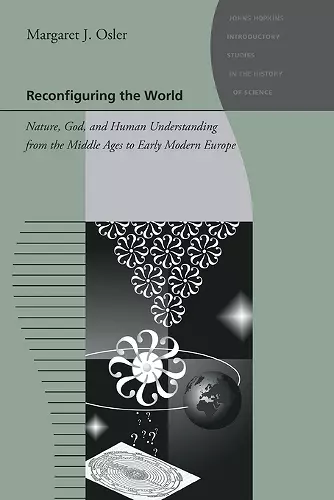Reconfiguring the World
Nature, God, and Human Understanding from the Middle Ages to Early Modern Europe
Format:Paperback
Publisher:Johns Hopkins University Press
Published:10th Sep '10
Should be back in stock very soon
This paperback is available in another edition too:
- Hardback£45.50(9780801896552)

Reconfiguring the World is a rich story that captures much of the best historiography of the past couple of decades-the exciting new work on alchemy, the religious roots of modern science, the contributions of Arabic thinkers (not just their 'transmitting' of Greek and Roman knowledge), and the integration of natural history and natural philosophy. -- Paul Lawrence Farber, Oregon State University
Ultimately, she shows how a few gifted students of nature changed the way we see ourselves and the universe.Change in human understanding of the natural world during the early modern period marks one of the most important episodes in intellectual history. This era is often referred to as the scientific revolution, but recent scholarship has challenged traditional accounts. Here, in Reconfiguring the World, Margaret J. Osler treats the development of the sciences in Europe from the early sixteenth to the late seventeenth centuries as a complex and multifaceted process. The worldview embedded in modern science is a relatively recent development. Osler aims to convey a nuanced understanding of how the natural world looked to early modern thinkers such as Galileo, Descartes, Boyle, and Newton. She describes investigation and understanding of the natural world in terms that the thinkers themselves would have used. Tracing the views of the natural world to their biblical, Greek, and Arabic sources, Osler demonstrates the impact of the Renaissance recovery of ancient texts, printing, the Protestant Reformation, and the exploration of the New World. She shows how the traditional disciplinary boundaries established by Aristotle changed dramatically during this period and finds the tensions of science and religion expressed as differences between natural philosophy and theology. Far from a triumphalist account, Osler's story includes false starts and dead ends. Ultimately, she shows how a few gifted students of nature changed the way we see ourselves and the universe.
An invaluable contribution to the literature of the history and philosophy of science, presented with clarity, intelligence, and economy... Highly recommended. Choice 2011
ISBN: 9780801896569
Dimensions: 229mm x 152mm x 13mm
Weight: 295g
200 pages